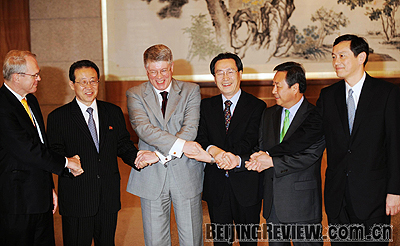|

REACHING CONSENSUS: Heads of delegations at the six-party talks hold hands before their meeting on July 10 in Beijing
The tense situation regarding North Korea's denuclearization has taken a quick turn for the better, with some eye-catching developments and the latest heads of delegation meeting of the six-party talks.
On June 26, North Korea issued a declaration of its nuclear programs and facilities to China. The next day, North Korea blew up its nuclear reactor cooling tower at Yongbyon.
The heads of delegation meeting of the sixth round of the six-party talks held in Beijing on July 10-12 broke a nine-month stalemate. The meeting included three new faces among the six heads of delegations: Saiki Akitaka, Director General for Asian and Oceanian Affairs from Japan's Ministry of Foreign Affairs; Kim Sook, Special Representative for Korean Peninsula Peace and Security Affairs from South Korea's Ministry of Foreign Affairs and Trade; and Alexei Borodavkin, Deputy Minister of Foreign Affairs of Russia. The three officials represented new governments that have come into power in their respective countries. They cooperated well with the three existing chief negotiators, Christopher R. Hill, Assistant Secretary for East Asian and Pacific Affairs from the U.S. State Department; Kim Gye Gwan, Vice Minister of Foreign Affairs of North Korea; and Wu Dawei, Vice Minister of Foreign Affairs of China. On the final day of their meeting, the envoys issued a press communiqué.
Cause for a breakthrough
International affairs observers said the pace of settling the Korean Peninsula's nuclear issue could pick up speed, because the press communiqué showed that the parties had established basic mutual trust.
Chinese Foreign Minister Yang Jiechi described the heads of delegation meeting on July 12 as "highly efficient." He noted that the six-party talks now are at a turning point as they move into the next phase, and they have an important opportunity to make new progress.
Experts said the meeting was "highly efficient" because North Korea and the United States reached a common understanding. Some analysts said they consider the result of the six-party talks a great success for Pyongyang. They said the country seized upon the U.S. President George W. Bush's eagerness to make progress on this issue before he ends his term in early 2009.
Shi Yongming, a researcher on Korean Peninsula nuclear studies at the China Institute of International Studies (CIIS), pointed out that the United States always has dominated the process of the six-party talks.
"The United States finally has taken a practical attitude on this issue, which is decisive to the process," he told Beijing Review, referring to the Americans' changed stance following North Korea's declaration of its nuclear programs. Washington was determined to get to the bottom of North Korea's nuclear capabilities through its declaration, while Pyongyang tried to keep the information undisclosed to retain some bargaining power after the issue had been settled, he said. The Americans' tough stance was unacceptable for the North Koreans, he said.
| 